The calm Baltic Sea under a wide, cloudless sky, a few small boats moored in the harbor, dock workers unloading the cargo of a sailing ship. This is how the Romantic painter Philipp Otto Runge saw the Peene in Wolgast at the beginning of the 19th century, captured in his work "Landscape on the Peene". Today, the harbor town is much busier. But the atmosphere that fascinated Runge and his contemporaries and friends Caspar David Friedrich and Friedrich August von Klinkowström back then can still be felt and experienced - art in Mecklenburg-Vorpommern.
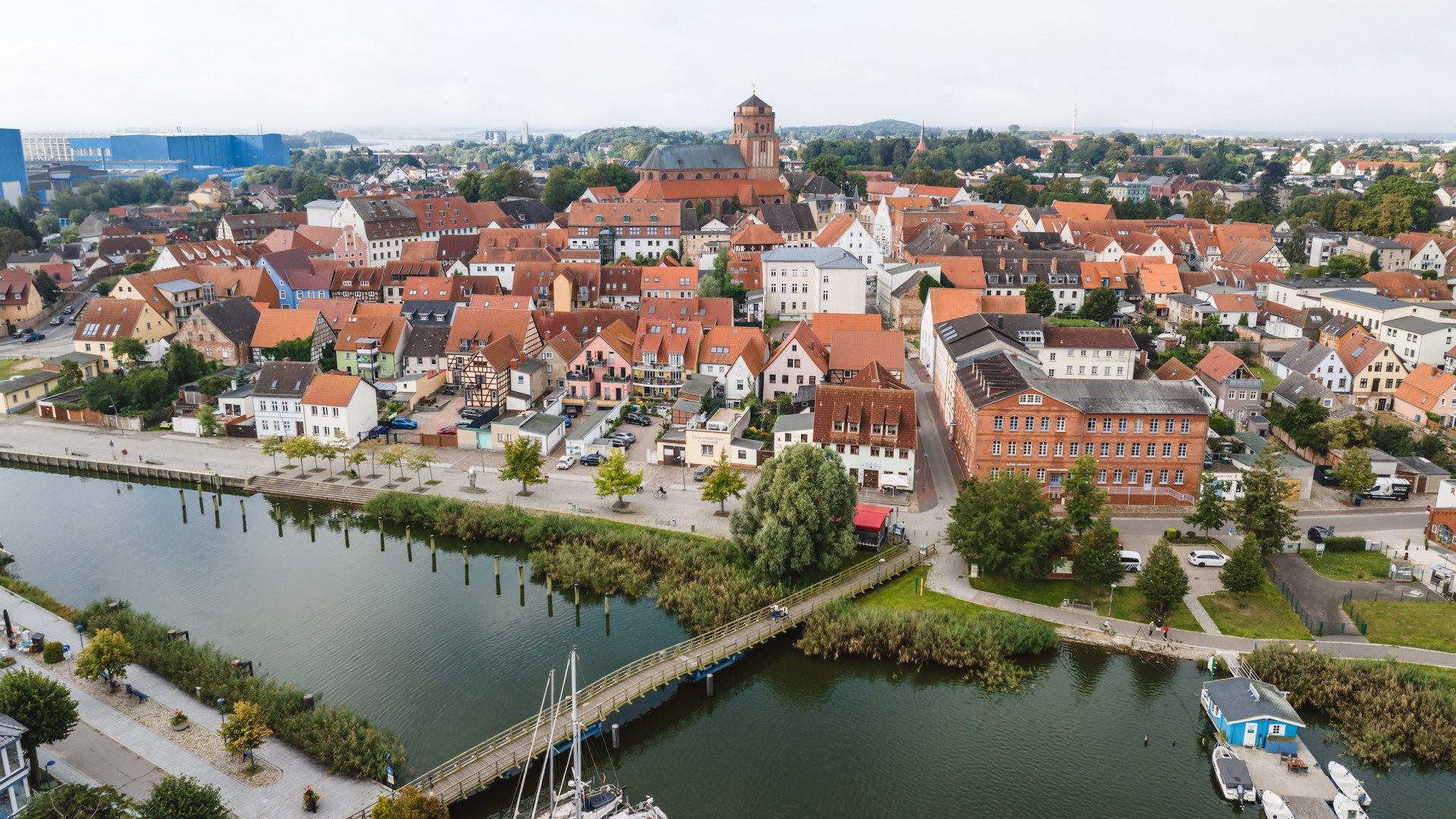
Wolgast
in Western Pomerania
W Frauke and Wolf are also fascinated by the world as the Romantic painters saw it. In 2018, the couple celebrated their wedding on the old viewing platform on the Königsstuhl in Rügen to mark the 200th anniversary of Caspar David Friedrich and his wife's honeymoon in Rügen. Is more romance possible? That's what the two now want to find out on the 54-kilometre-long North German Romantic Route from Wolgast via Greifswald to Stahlbrode - and follow the pictorial footprints of the famous painters. Or rather, tire tracks. Frauke and Wolf get on the saddle of their bicycles.
In the eye of the painter
The starting point is the picturesque Wolgast market square, which is dominated by the many colorful facades all around and the whitewashed town hall. In the bright sunshine, you almost have to hold your hand in front of your eyes. From here, it is not far to the city harbor, which Philipp Otto Runge already captured in his paintings. The painter's birthplace in the historic old town provides information about him. Today, the building houses the Rungehaus Museum, which provides an insight into the Romantic era.
But now off to the next stop. The two of them get on their bikes. Helmet on, luggage lashed down, off they go. The route runs along the Baltic Sea coastal cycle path and, as the name suggests, follows the picturesque coastline of Western Pomerania. The sleepy fishing village of Freest, where Caspar David Friedrich stopped on his honeymoon with Caroline Bommer in 1818, is skipped by active vacationers today. Instead, they are all the more looking forward to a tasty snack in the seaside resort of Lubmin.
From the expansive sandy beach in the cozy spa town, you have an unobstructed and unforgettable view of the opposite Rügen, and above all of the offshore island of Vilm, but also of the gentle rolling landscape of the Münchgut peninsula in southern Rügens, which the painter also explored while hiking on his Rügen trips. „Now Caspar David Friedrich would be looking at us“, Frauke remarks suddenly. And indeed: the Romantic artist captured the incomparable view of the mainland on canvas from the island in 1801. „View from the Südküste Rügens” from 1801 is the name of the cultural asset.
Modeling for world-famous artists makes you hungry, and that's why you stop off at the small bistro “Alte Wetterstation” right on the waterfront. After a first refreshing Pilsner, the owner serves a crispy tarte flambée for Frauke and homemade pasta for Wolf. „For a little ‚Dolce Vita‘ on the Baltic Sea“, she adds with a wink. The sweet life can definitely be enjoyed to the full in this way.
Just a little further on, holidaymakers discover an almost untouched stretch of beach. Only when you have ventured through the vegetation close to the shore do you discover this wild and romantic spot, where the Baltic Sea works its way along a few boulders on the beach. „Look, a swing“, Frauke calls out to her husband in surprise. Of course they take a short break and try out the wooden swing. When do you ever have an opportunity like this?




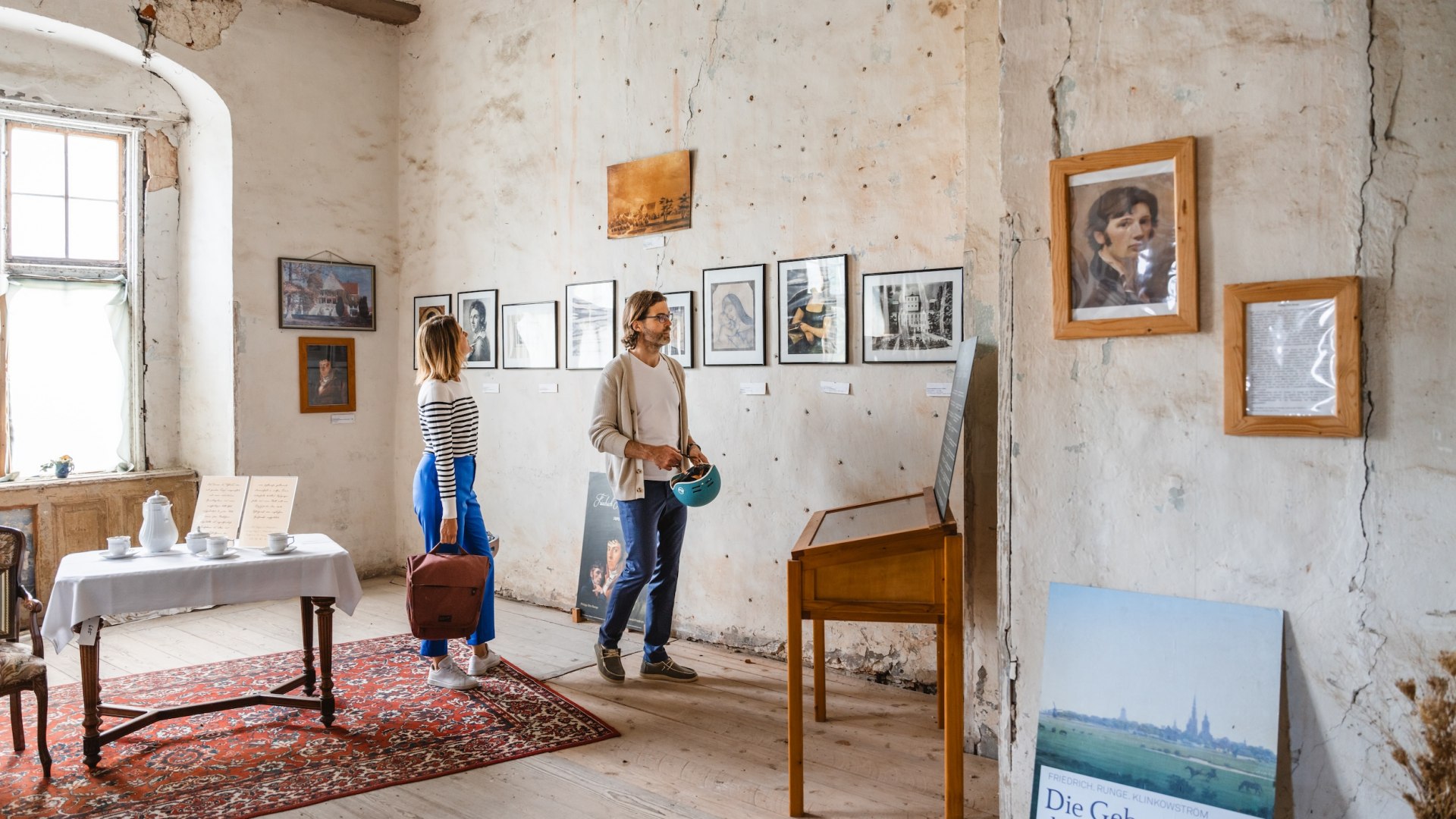
A castle in a thorny sleep
With fresh energy, the wedding couple cycle further along the coast. Ludwigsburg Castle lies on the coast opposite Greifswald. As you pass through the wooden archway of the grounds and enter another era, as it were, the three-storey palace rises up imposingly. Once built as a retreat for the Pomeranian duke's wife Sophia Hedwig, the building now lies as if in a thorny slumber, surrounded by an equally enchanted castle garden. Some of the building's windows are even boarded up, and the façade is chipped in places.
However, culture fans are not put off by this, quite the opposite. Because inside Ludwigsburg Palace, an incomparable cross-section of its architectural history awaits. Literally. Stone vaulting peeps out from beneath broken parquet flooring, while worn stucco ceilings await restoration. Over the centuries, the changing lords of the castle have repeatedly rebuilt, redesigned and redrawn the rooms. As part of the ongoing renovation work, the various rooms are now being restored to the state they were intended to be in during the many eras of the castle's history.
Home of the Romantic era
The stately manor was once owned by the Pomeranian noble family Klinkowstrum, from which the Romantic painter Friedrich August also descended. The creative scion of the nobility was not only connected to Caspar David Friedrich and Philipp Otto Runge through his love of painting and the famous nature of the Baltic Sea coast, but also through a deep friendship. And even if the trio may never have been in Ludwigsburg at the same time, the essence of North German Romanticism can be seen here as if under a burning glass.
„What are the three tea sets doing here?“, wonders Wolf. In the middle of a room on the upper floor is a small table with three decorated porcelain teacups, paired with a matching teapot and a sugar bowl. Did the wedding couple surprise the restorers at afternoon tea? Far from it. Rather, the cups represent the three Romantics Friedrich, Runge and Klinkowstr. The small exhibition sheds light on the relationship between the exceptional talents and provides interesting facts about the castle's history.
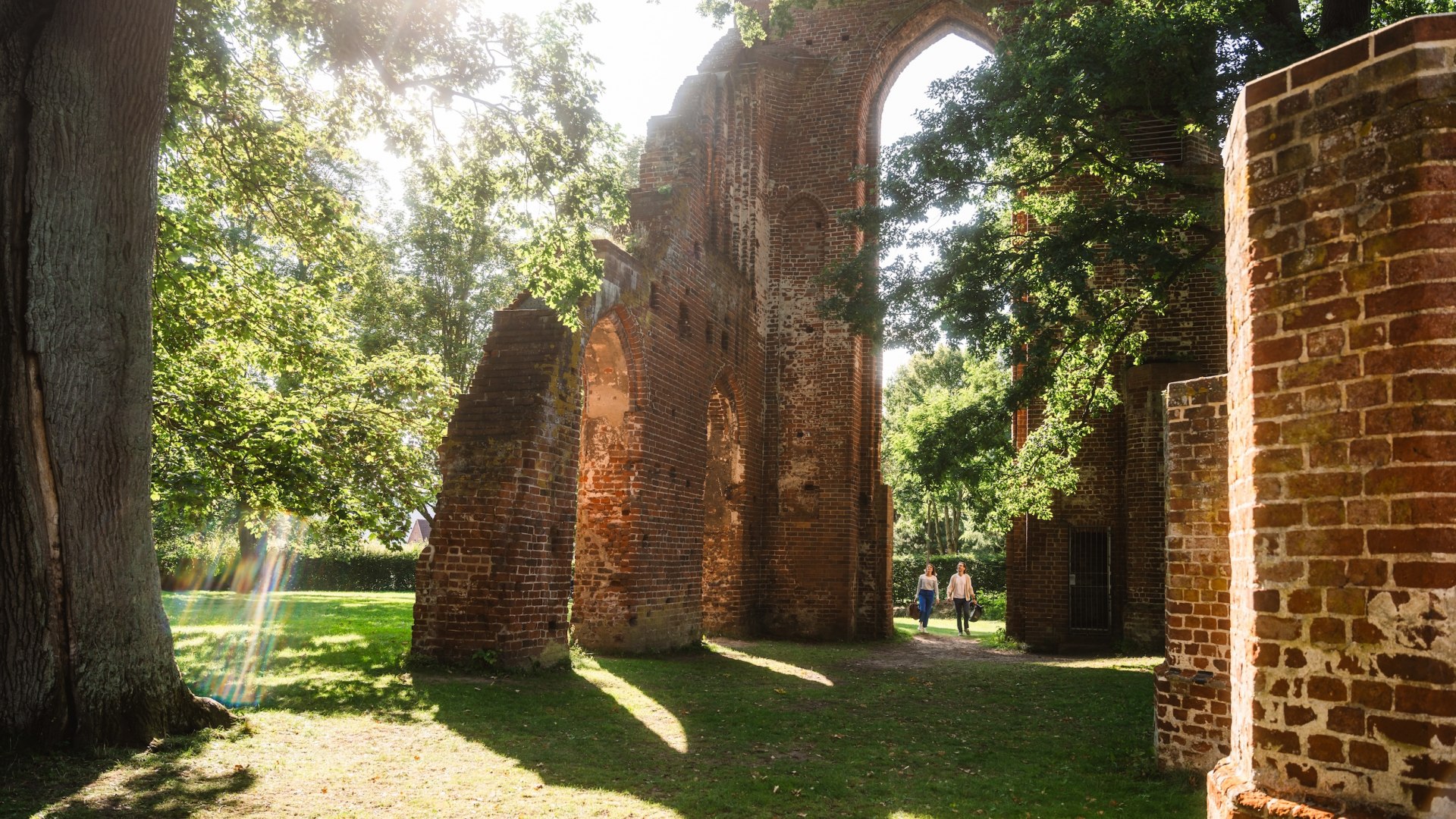
Baking stone wherever the eye looks
But now it's time to get back out into the fresh coastal air and onto our trusty bikes for the last section of the route. Frauke and Wolf cycle along the Dänische Wiek - the name of the Baltic Sea bay into which the River Ryck flows near Greifswald - to the medieval monastery ruins of Eldena. This silent witness rises up on the edge of the ancient Hanseatic town and allows visitors to step back in time. The first thing that catches the eye are the powerful red bricks that are still so typical of the architecture on the Baltic coast. The intense green that the buildings confidently apply to the grounds, which have been developed into a park, creates an intense, fascinating color contrast in which you want to lose yourself.
Without a doubt, one part of the monastery ruins is the absolute crowd-puller: the imposing westwork. Wolf has to stretch his head upwards as the two of them walk through the portal that reaches for the sky. „Caspar David Friedrich also used this view“, it occurs to the cultural connoisseur. In fact, the North German painter included the unmistakable portal in several of his works and was happy to take some liberty with the design of the surroundings. In the romantic-mysterious „Eldena in the Giant Mountains“, the westwork is unceremoniously relocated to the present-day Czech Republic. He deserves credit, after all, this has created art for the ages.
Next stop: Rügen
Richly filled with impressions and glimpses of the Romantic era, the active holidaymakers decide to give their bodies another good workout. They cycle a final section along the coast to the Rügen jetty in Stahlbrode. It feels like you could jump from here onto perhaps the most beautiful island in the Baltic Sea, the inlet that separates Rügen from the mainland is just that narrow. To coincide with the upcoming Caspar David Friedrich anniversary in 2024 - the 250th anniversary of the painter's birth - the North German Romanticism route will be extended to Cape Arkona on Rügen, integrating further places of inspiration such as the chalk cliffs with the Künigsstuhl National Park Center. Frauke and Wolf, however, prefer to sit on the quay wall and enjoy the well-deserved warming sunset over the island and the Baltic Sea. After all, this is also a kind of North German romance.
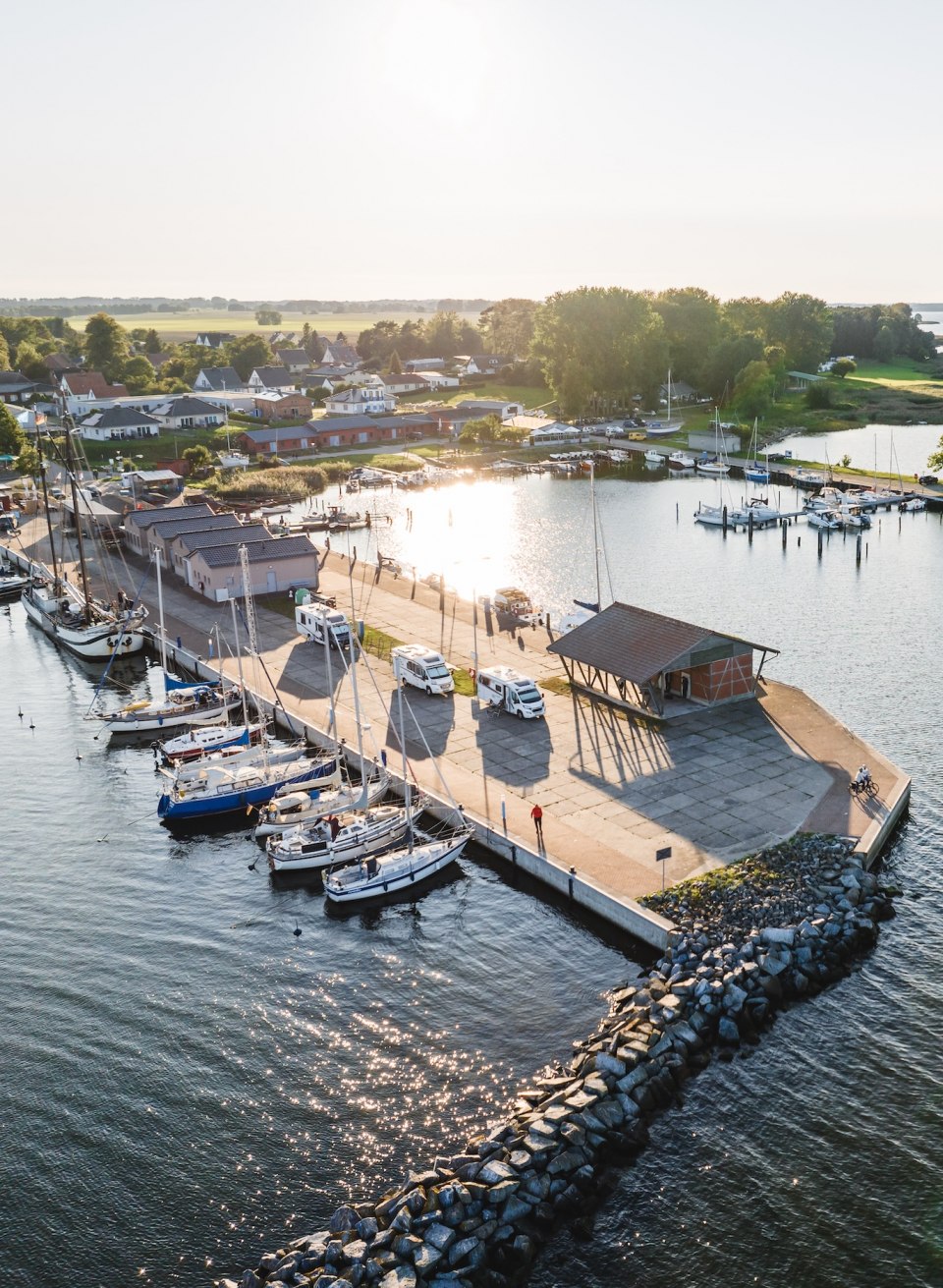


Romanticism bike tour in Vorpommern
- Length: 293 km
- Etappen: 7
Stages: 1 day From the Eldena monastery ruins to the Rungehaus in Wolgast - the "Route of North German Romanticism" combines the art and literature of Romanticism with today's nature experience along the coast of the Greifswald Bodden.
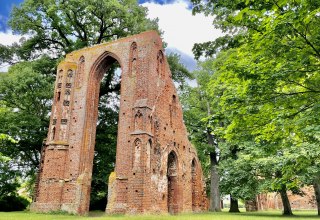
Eldena monastery ruins
- Freely accessible at any time
- Wolgaster Landstraße, 17493 Greifswald
The monastery ruins and park are a popular excursion destination for Greifswald residents and their guests. The monastery ruins are also the starting and finishing point of the themed cycle path "Route of North German Romanticism", which traces the stations and lives of the North German Romantics of Western Pomerania.

Romanticism bike tour in Vorpommern
- Length: 293 km
- Etappen: 7
Stages: 1 day From the Eldena monastery ruins to the Rungehaus in Wolgast - the "Route of North German Romanticism" combines the art and literature of Romanticism with today's nature experience along the coast of the Greifswald Bodden.
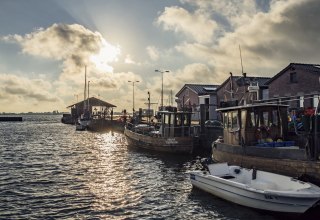
Harbour Stahlbrode
- Freely accessible at any time
- Dorfstraße, 18519 Stahlbrode
The port of Stahlbrode is located on the west bank of the Strelasund. The harbour has two harbour basins with over 60 berths. The facilities of the northern harbour were modernised in 1997. A car ferry connects the mainland with the island of Rügen (ferry Stahlbrode - Glewitz)
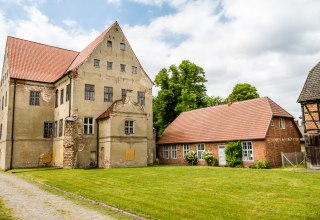
Ludwigsburg Palace
- Schlosshof, 17509 Ludwigsburg
The Renaissance palace Ludwigsburg was built between 1577 and 1592 as a widow's seat for Hedwig Sophie von Pommern-Wolgast. After her death in 1631 the palace changed hands several times until it was sold to the Greifswald merchant Weissenborn in 1810.
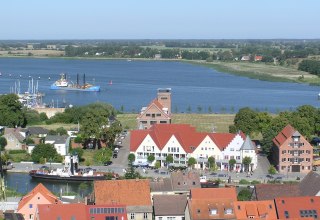
Wolgast castle island
- Bogislavstraße, 17438 Wolgast
Former site of the duke's castle.
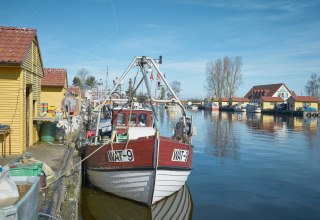
Fishing Harbor Freest
- Dorfstraße, 17440 Freest
The fishing village Freest is located directly at the mouth of the Peene River to the Bay of Greifswalder and is home to the largest fishing port in Mecklennburg-Vorpommern (MV). Every 5th fish in MV is caught here, mostly herring, flounder and cod. Also the oldest smokehouse in Vorpommern is located near the harbour. From May to October guests can take the ferry to the island of Usedom, Peenemünde, every hour from May to October. Bicycle transport is also possible.
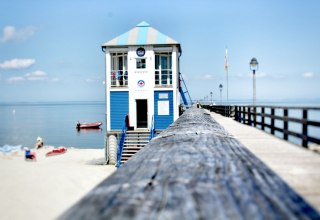
Seaside Resort of Lubmin
- Waldstraße, 17509 Lubmin
The peaceful seaside resort of Lubmin with its 350 m long pier, a wide child-friendly sandy beach and picturesque and quaint pine forests is perfect for a family holiday. Lubmin is one of the stations of the "Route of North German Romanticism".







